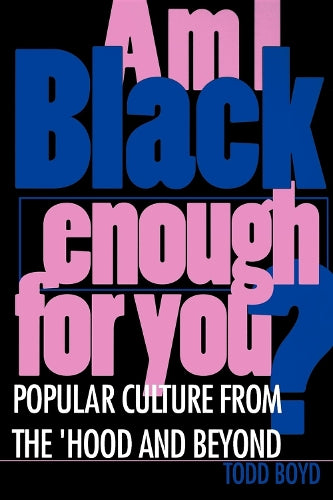Am I Black Enough for You?
Am I Black Enough for You?
Regular price
Checking stock...
Regular price
Checking stock...
Summary
Explores race and class in mainstream representation of African American popular culture.
The feel-good place to buy books
- Free US shipping over $15
- Buying preloved emits 41% less CO2 than new
- Millions of affordable books
- Give your books a new home - sell them back to us!

Am I Black Enough for You? by Todd Edward Boyd
The most creative moments of African American culture have always emanated from a lower class or "ghetto" perspective. In contemporary society, this ghetto aesthetic has informed a large segment of the popular marketplace from the incendiary nature of gangsta rap, through the choreographed violence of films like Menace II Society, to recurrent debates around the use of the word "nigga," and even the assertion of this perspective in professional basketball. In each case, most of the discussion around these cultural circumstances tends to be dismissive, if not completely uninformed. In analyzing the ranges of images from the O. J. Simpson trial to Snoop Doggy Dogg, Am I Black Enough for You looks at the way in which the nuances of ghetto life get translated into the politics of popular culture, and especially the way these politics have become such a profitable venture, for both the entertainment industry and the actual producers of these topical narratives. The book follows the widening generation gap represented by Bill Cosby's pristine "race man" image in the mid-80's, culminating in the proliferation of the hard-core sentiments associated with the nigga in the 1990's. The book argues for a historical understanding of these contemporary examples, which is rooted in the social policies of the Reagan/Bush era, the declining industrial base of urban communities and the increasing significance of the drug trade and gang culture. In addition, the book follows the evolution of gangster culture in twentieth century American popular culture and the shift from ethnicity to race that slowly begins to emerge over this time period. Contrary to mainstream conservative sentiment, Am I Black Enough for You suggests that the criticism of gangsta culture is a misguided attempt which reaffirms traditional views about Black culture. This criticism is articulated across race, so that in many cases, African Americans articulate the same sentiments as their white conservative counterparts. Am I Black Enough for You offers astute analysis of the liberating possibilities of representation that lie at the core of contemporary black popular culture.
"With this book, Boyd has exponentially increased understanding of the cultural genesis and evolution of the "new" black aesthetics.. The language has an "in-your-face" tone, yet it exemplifies the best in scholarly discourse. From start to finish readers will be mesmerized by the "new jack" style." - Choice "From how rap music relates to politics and black masculinity to differences between folk and popular culture in the black community, this provides much food for thought." - Midwest Book Review "Boyd ... fuses academic analysis with hipness in his compassionate and insightful dissection of how the media, especially Hollywood, define African American culture ... Boyd, compelling and thought-provoking, reveals how paradoxical life is for African Americans, even those at the top of their game." - Booklist
Todd Boyd, Assistant Professor of Critical Studies at the USC School of Cinema-Television, has published in Wide Angle, Cineaste, Filmforum, and Public Culture, and is the co-editor of Out of Bounds: Sports, Media, and the Politics of Identity (in this catalog). He has also written on popular culture for the Chicago Tribune and the Los Angeles Times.
| SKU | Unavailable |
| ISBN 13 | 9780253211057 |
| ISBN 10 | 0253211050 |
| Title | Am I Black Enough for You? |
| Author | Todd Edward Boyd |
| Condition | Unavailable |
| Binding Type | Paperback |
| Publisher | Indiana University Press |
| Year published | 1997-03-22 |
| Number of pages | 176 |
| Cover note | Book picture is for illustrative purposes only, actual binding, cover or edition may vary. |
| Note | Unavailable |
